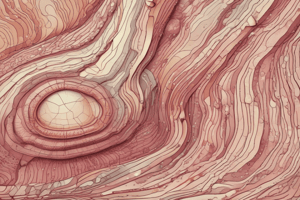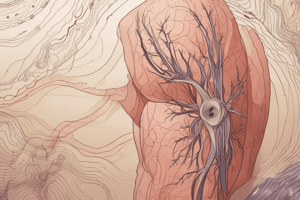Podcast
Questions and Answers
What is the primary function of the integumentary system?
What is the primary function of the integumentary system?
- To act as a physical barrier to protect the body from invading pathogens and injury (correct)
- To produce movement of bones
- To generate heat for the body
- To provide structural framework for the body
Which organ system is responsible for producing vitamin D with the help of sunlight?
Which organ system is responsible for producing vitamin D with the help of sunlight?
- Muscular System
- Integumentary System (correct)
- Nervous System
- Skeletal System
What is the primary component of the muscular system?
What is the primary component of the muscular system?
- Brain and spinal cord
- Skeletal muscles attached to the skeleton (correct)
- Bones and cartilages
- Nerves and sensory receptors
Which organ system provides muscle attachment for movement?
Which organ system provides muscle attachment for movement?
What is the primary function of the nervous system?
What is the primary function of the nervous system?
What is the site of blood cell formation?
What is the site of blood cell formation?
What is the byproduct of muscle contraction?
What is the byproduct of muscle contraction?
Which organ system includes hair and fingernails?
Which organ system includes hair and fingernails?
What is the primary function of the lymphatic system in the human body?
What is the primary function of the lymphatic system in the human body?
Which system is responsible for exchanging gases with the blood through air sacs called alveoli?
Which system is responsible for exchanging gases with the blood through air sacs called alveoli?
Which organ system breaks down and digests food, allowing for nutrient absorption into the blood?
Which organ system breaks down and digests food, allowing for nutrient absorption into the blood?
What is the primary function of the urinary system in the human body?
What is the primary function of the urinary system in the human body?
Which system includes the kidneys, ureters, urinary bladder, and urethra?
Which system includes the kidneys, ureters, urinary bladder, and urethra?
What is the primary function of the lymphoid organs, such as the spleen and thymus?
What is the primary function of the lymphoid organs, such as the spleen and thymus?
Which system is responsible for supplying the body with oxygen and removing carbon dioxide?
Which system is responsible for supplying the body with oxygen and removing carbon dioxide?
What is the primary function of the lymphatic vessels in the human body?
What is the primary function of the lymphatic vessels in the human body?
What is the primary function of the nervous system in responding to stimuli?
What is the primary function of the nervous system in responding to stimuli?
Which of the following endocrine glands is responsible for regulating reproductive functions?
Which of the following endocrine glands is responsible for regulating reproductive functions?
What is the primary function of the cardiovascular system?
What is the primary function of the cardiovascular system?
Which of the following is NOT a function of the nervous system?
Which of the following is NOT a function of the nervous system?
What is the role of sensory receptors in the nervous system?
What is the role of sensory receptors in the nervous system?
Which of the following organs is part of the endocrine system?
Which of the following organs is part of the endocrine system?
What is the relationship between the nervous system and the endocrine system?
What is the relationship between the nervous system and the endocrine system?
What is the primary function of the hypothalamus?
What is the primary function of the hypothalamus?
Flashcards are hidden until you start studying
Study Notes
Integumentary System
- Forms the external body covering, including skin, hair, and fingernails
- Waterproofs the body
- Acts as a physical barrier to protect the body from invading pathogens and injury
- Produces vitamin D with the help of sunlight
- Excretes salts in perspiration
- Helps regulate body temperature
- Location of cutaneous nerve receptors
Skeletal System
- Consists of bones, cartilages, ligaments, and joints
- Gives the body structural framework
- Provides muscle attachment for movement
- Protects vital organs
- Site of blood cell formation
- Stores minerals
Muscular System
- Consists of skeletal muscles attached to the skeleton
- Produces movement of bones
- Supports and stabilizes certain body structures
- Generates heat for the body (a byproduct of contraction)
Nervous System
- Consists of the brain, spinal cord, nerves, and sensory receptors
- Responds to internal and external stimuli
- Sensory receptors detect changes
- Messages are sent to the central nervous system
- Central nervous system assesses information and activates effectors (muscles and glands)
Endocrine System
- Comprised of many glands that secrete chemical messengers (hormones) into the blood
- Works closely with the Nervous System to regulate and control bodily functions
- Body functions controlled by hormones include growth, reproduction, and use of nutrients
- Endocrine glands include the hypothalamus, pituitary gland, thyroid and parathyroids, adrenal glands, thymus, pancreas, pineal gland, and ovaries (females) and testes (males)
Cardiovascular System
- Includes the heart, blood, and blood vessels
- Heart pumps blood
- Vessels transport blood to tissues
- Pumps and transports blood around the body, containing oxygen, carbon dioxide, nutrients, hormones, and metabolic waste products
Lymphatic System
- Includes lymph, lymphatic vessels, lymph nodes, and lymphoid organs (spleen, thymus, MALT tissue)
- Re-absorbs leaked fluids from the extracellular spaces and returns it back to the bloodstream
- Absorbs lipids and lipid-soluble vitamins directly from the digestive tract
- Plays a huge role in immune function
Respiratory System
- Includes the nasal passages, pharynx, larynx, trachea, bronchi, and lungs
- Gases are exchanged with the blood through air sacs (alveoli) in the lungs
- Supplies the body with necessary oxygen (absorption)
- Removes carbon dioxide (excretion)
Digestive System
- Includes the oral cavity (mouth), esophagus, stomach, small and large intestines, rectum, and accessory organs
- Breaks down and digests food
- Allows for nutrient absorption into blood
- Eliminates indigestible material as feces
Urinary System
- Includes the kidneys, ureters, urinary bladder, and urethra
- Eliminates nitrogenous wastes
- Maintains acid-base balance
- Regulates water and electrolyte balance
- Helps regulate blood pressure
Studying That Suits You
Use AI to generate personalized quizzes and flashcards to suit your learning preferences.




